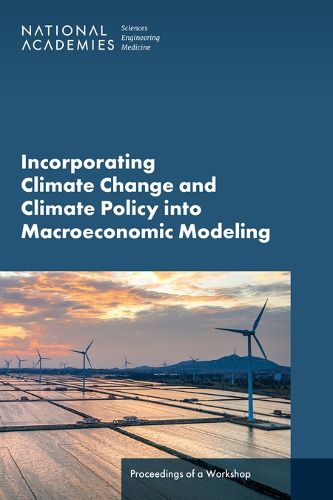Readings Newsletter
Become a Readings Member to make your shopping experience even easier.
Sign in or sign up for free!
You’re not far away from qualifying for FREE standard shipping within Australia
You’ve qualified for FREE standard shipping within Australia
The cart is loading…






Macroeconomic models, essential for decision making and federal budget planning, may not appropriately consider the wide breadth of climate-related impacts that potentially have large macroeconomic significance. Challenges integrating climate factors into macroeconomic analyses can stem from the complexity of macroeconomics, climate science, policy instruments, and their interactions. Although economists have made progress in developing tools to understand climate-related impacts on the macroeconomy, much of the climate and macroeconomic research has historically been conducted in disciplinary silos that can limit a holistic understanding of climate-related impacts on the macroeconomy.
The National Academies of Sciences, Engineering, and Medicine, under the auspices of the Roundtable on Macroeconomics and Climate-Related Risks and Opportunities, convened a workshop on June 14-15, 2023, to consider current macroeconomic models and suggest opportunities that may improve the incorporation of climate-related factors into macroeconomic modeling. Through panels of invited speakers and an interactive breakout
discussion, the workshop explored an array of macroeconomic models and potential pathways to integrate some of the physical and transition effects of climate change. This publication summarizes the presentations and discussion of the workshop.
Table of Contents
Front Matter Overview 1 Introduction 2 Federal Macroeconomic Modeling Examples 3 Research Landscape 4 Economic Impacts of, Damages from, and Risks of Climate Change 5 Projecting Economic and Financial Impacts of a Transition to a Low-Greenhouse Gas Economy 6 Public and Financial Sector Climate Risks and Response and their Macroeconomic Implications 7 Crosscutting Themes 8 Applying Insights Glossary References Appendix A: Workshop Agenda Appendix B: Statement of Task Appendix C: Planning Committee Biographies
$9.00 standard shipping within Australia
FREE standard shipping within Australia for orders over $100.00
Express & International shipping calculated at checkout
Macroeconomic models, essential for decision making and federal budget planning, may not appropriately consider the wide breadth of climate-related impacts that potentially have large macroeconomic significance. Challenges integrating climate factors into macroeconomic analyses can stem from the complexity of macroeconomics, climate science, policy instruments, and their interactions. Although economists have made progress in developing tools to understand climate-related impacts on the macroeconomy, much of the climate and macroeconomic research has historically been conducted in disciplinary silos that can limit a holistic understanding of climate-related impacts on the macroeconomy.
The National Academies of Sciences, Engineering, and Medicine, under the auspices of the Roundtable on Macroeconomics and Climate-Related Risks and Opportunities, convened a workshop on June 14-15, 2023, to consider current macroeconomic models and suggest opportunities that may improve the incorporation of climate-related factors into macroeconomic modeling. Through panels of invited speakers and an interactive breakout
discussion, the workshop explored an array of macroeconomic models and potential pathways to integrate some of the physical and transition effects of climate change. This publication summarizes the presentations and discussion of the workshop.
Table of Contents
Front Matter Overview 1 Introduction 2 Federal Macroeconomic Modeling Examples 3 Research Landscape 4 Economic Impacts of, Damages from, and Risks of Climate Change 5 Projecting Economic and Financial Impacts of a Transition to a Low-Greenhouse Gas Economy 6 Public and Financial Sector Climate Risks and Response and their Macroeconomic Implications 7 Crosscutting Themes 8 Applying Insights Glossary References Appendix A: Workshop Agenda Appendix B: Statement of Task Appendix C: Planning Committee Biographies